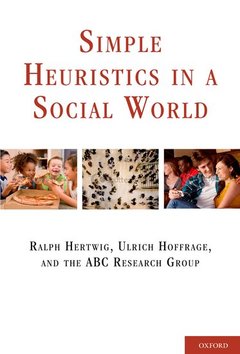Description
Simple Heuristics in a Social World
Evolution and Cognition Series
Coordinators: Hertwig Ralph, Hoffrage Ulrich, Research Group ABC
Language: English
Subjects for Simple Heuristics in a Social World:
Publication date: 12-2012
672 p. · 16.2x24.2 cm · Hardback
672 p. · 16.2x24.2 cm · Hardback
Description
/li>Contents
/li>Biography
/li>
Simple Heuristics in a Social World invites readers to discover the simple heuristics that people use to navigate the complexities and surprises of environments populated with others. The social world is a terrain where humans and other animals compete with conspecifics for myriad resources, including food, mates, and status, and where rivals grant the decision maker little time for deep thought, protracted information search, or complex calculations. Yet, the social world also encompasses domains where social animals such as humans can learn from one another and can forge alliances with one another to boost their chances of success. According to the book's thesis, the undeniable complexity of the social world does not dictate cognitive complexity as many scholars of rationality argue. Rather, it entails circumstances that render optimization impossible or computationally arduous: intractability, the existence of incommensurable considerations, and competing goals. With optimization beyond reach, less can be more. That is, heuristics--simple strategies for making decisions when time is pressing and careful deliberation an unaffordable luxury--become indispensible mental tools. As accurate as or even more accurate than complex methods when used in the appropriate social environments, these heuristics are good descriptive models of how people make many decisions and inferences, but their impressive performance also poses a normative challenge for optimization models. In short, the Homo socialis may prove to be a Homo heuristicus whose intelligence reflects ecological rather than logical rationality.
Contents. Part I The Research Agenda. 1. Simple Heuristics: The Foundations of Adaptive Social Behavior. Ralph Hertwig and Ulrich Hoffrage. Part II Heuristics in Social Games. 2. Simple Heuristics in a Social Game. Ralph Hertwig, Urs Fischbacher, and Adrian Bruhin. 3. Trust-Your-Doctor: A Simple Heuristic in Need of a Proper Social Environment. Odette Wegwarth and Gerd Gigerenzer. 4. Probabilistic Persuasion: A Brunswikian Theory of Argumentation. Torsten Reimer, Ralph Hertwig, amd Sanja Sipek. 5. Cooperate with Equals: A Simple Heuristic for Social Exchange. Tim Johnson and Oleg Smirnov. 6. The Is and Ought of Sharing: The Equality Heuristic Across the Lifespan. Monika Keller, Michaela Gummerum, Thomas Canz, Gerd Gigerenzer, and Masanori Takezawa. Part III Structures of Social Worlds. 7. When Will We Meet Again? Regularities of Social Connectivity and Their Reflections in Memory and Decision Making. Thorsten Pachur, Lael J. Schooler, and Jeffrey R. Stevens. 8. Fast Acceptance by Common Experience: Augmenting Schelling's Neighborhood Segregation Model with FACE-Recognition. Nathan Berg, Katarzyna Abramczuk, and Ulrich Hoffrage. Part IV Social Information, Collective Decision Making, and Social Learning. 9. The Mind as an Intuitive Pollster: Frugal Search in Social Spaces. Thorsten Pachur, Ralph Hertwig, and Jorg Rieskamp. 10. The alt,"Less-is-Moreagt," Effect in Group Decision Making. Shengua Luan, Konstantinos V. Katsikopoulos, and Torsten Reimer. 11. Simple Heuristics and Information Sharing in Groups. Torsten Reimer and Ulrich Hoffrage. 12. How to Find Good Cue Orderings: When Social Learning Benefits Simple Heuristics. Rocio Garcia-Retamero, Masanori Takezawa, Jan K. Woike, and Gerd Gigerenzer. 13. The Advice of Others: When and How We Benefit From It. Guido Biele and Jorg Rieskamp. Part V Simple Heuristics and Social Rationality. 14. The Evolutionary Rationality of Social Learning. Richard McElreath, Annika Wallin, and Barbara Fasolo. 15. The Lives of Others: Social Rationality in Animals. Jeffrey R. Stevens and Andrew J. King. 16. The Heart Has Its Reasons: Social Rationality in Mate Choice. Alison P. Lenton, Lars Penke, Peter Todd, and Barbara Fasolo. 17. Can Simple Heuristics Explain Moral Inconsistencies?. Nadine Fleischhut and Gerd Gigerenzer. 18. Why Simple Heuristics Make Life Both Easier and Harder: A Social-Psychological Perspective. Klaus Fiedler and Michaela Wanke. References. Name Index. Subject Index.
Ralph Hertwig is Professor of Cognitive and Decision Sciences, Department of Psychology, University of Basel. He studies bounded and social rationality, experienced-based decision making, and the methodology of the social sciences. He was a recipient of the Heinz Heckhausen Young Scientist Prize and the Charlotte-und-Karl-Bühler Young Career Award. Ulrich Hoffrage is Professor of Decision Theory and Risk, Graduate Business School of Economics (Ecole des Hautes Etudes Commerciales; HEC), University of Lausanne, Switzerland
© 2024 LAVOISIER S.A.S.




